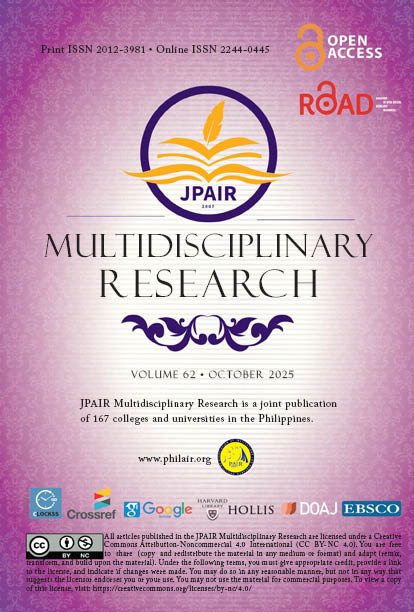Leveraging Predictive Analytics and the Sustainable Livelihood Framework for Rural Enterprise: The Case of Coconut Coir Bags Production in the Philippines
DOI:
https://doi.org/10.7719/jpair.v62i1.956Keywords:
Business Intelligence, Coconut Coir Bags, Predictive Analytics, Power BI, Sustainable Livelihood, quantitative, PhilippinesDisciplines:
Sustainable Entrepreneurship, Rural Livelihood DevelopmentAbstract
This study examines the potential opportunities for coconut coir bags as sustainable livelihood products in some rural regions of the Philippines. The research employs a quantitative methodology based on the Sustainable Livelihood Framework (SLF) and the Technology Acceptance Model (TAM), utilizing Microsoft Power BI as the primary tool for predictive data analytics and visualization. The study noted that agricultural waste, such as coconut coir, recognized as abundant and sustainable, is critical for production due to its low cost and environmental benefits. A profit of 60% per unit sold is estimated based on data analysis. As reflected in the responses of domestic tourists, there is an apparent inclination towards purchasing products with a moderate to high spending appetite and a clearly defined perception of value related to such environmentally friendly products. Power BI is utilized for data visualization and to predict the company's future needs, which helps identify the required production level. Visual analysis from dashboards enables better strategic decision-making since the economic logic of product development using coir to promote entrepreneurship in rural areas is viable. Furthermore, this analysis supports Sustainable Development Goals (SDGs) 12 and 13 by promoting eco-sensitive consumption, circular economy strategies, innovative design approaches, and environmental accountability in product development.
Downloads
References
Adeel, S., Kiran, S., Shahid, M., Habib, S. R., & Hussaan, M. (2021). Ecofriendly application of coconut coir extract for silk dyeing. Environmental Science and Pollution Research, 29(4). https://doi.org/10.1007/s11356-021-15669-6
Batocol, A. T., & Delos Santos, T. (2018). Coconut husk availability and utilization in major Philippine provinces. International Journal of Environmental and Rural Development, open access iserd.net
Department of Trade and Industry (DTI). (n.d.). Coco Coir Industry Development. Retrieved from https://industry.gov.ph/wp-content/uploads/2015/11/National-Coco-Coir-Road-Map-by-OIC-ARD-Marcelina-Alcantara-DTI-IV-A.pdf
Downloads
Published
Issue
Section
License
Copyright (c) 2025 Remegia C. Jacob, Richelle D. Maylad, Maylen G. Eroa

This work is licensed under a Creative Commons Attribution-NonCommercial 4.0 International License.
Open Access. This article published by JPAIR Multidisciplinary Research is licensed under a Creative Commons Attribution-Noncommercial 4.0 International (CC BY-NC 4.0). You are free to share (copy and redistribute the material in any medium or format) and adapt (remix, transform, and build upon the material). Under the following terms, you must give appropriate credit, provide a link to the license, and indicate if changes were made. You may do so in any reasonable manner, but not in any way that suggests the licensor endorses you or your use. You may not use the material for commercial purposes.





















